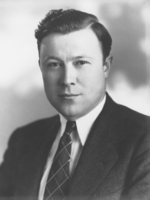 | Back to e-WV
| Back to e-WV
 The West Virginia Encyclopedia
The West Virginia Encyclopedia
 | Back to e-WV
| Back to e-WV
 The West Virginia Encyclopedia
The West Virginia Encyclopedia

Labor leader Walter Phillips Reuther (September 1, 1907-May 9, 1970) was long-time president of the United Auto Workers and a founder of the modern labor movement. He was born to German immigrant parents in Wheeling. Reuther’s father, Valentine, was president of the Wheeling brewers union and a leader of the city’s Socialist Party.
Walter began work as an apprentice tool and die maker at Wheeling Steel in 1924. By 1927, he moved to Detroit, where he became one of the highest-paid skilled workers at the Ford Motor Company. Fired by Ford for his union activities, he and his brother, Victor, bicycled through Europe and worked for more than a year at a Ford-built plant in the Soviet Union. Reuther returned to Detroit just at the time when industrial unionism was becoming a major force. Seizing the moment, he organized and was elected president of what became one of the most important locals in the United Auto Workers.
Reuther’s national reputation grew as he made significant contributions to the progress of the UAW. By 1937, he represented 30,000 workers in 76 shops and had helped to develop strategies, including the sit-down strike, that won union contracts from major automakers. In less than a decade, he moved up through union offices to become national UAW president. Over the next few years, Reuther achieved massive gains for his membership that included cost-of-living increases, productivity pay raises, and unemployment benefits. He was elected president of the Congress of Industrial Organizations in 1952. Three years later, he helped merge the CIO with the American Federation of Labor.
Reuther’s detractors claim that as he grew in power, he became increasingly conservative, as exemplified by his political attacks on communists and other left wingers who had helped to build the UAW. It has also been argued that the prosperity Reuther obtained for auto workers came at the price of diminished rank-and-file control over union policy and an acquiescence in management’s control over production decisions. But in the late 1960s, Reuther led his auto workers out of the AFL-CIO in protest to that giant labor alliance’s failure to organize the growing service sector of the American economy.
Regardless of their differences, champions and detractors agree that Walter Reuther was arguably the most influential labor leader in post-World War II America. He died in a plane crash.
Written by Fred A. Barkey